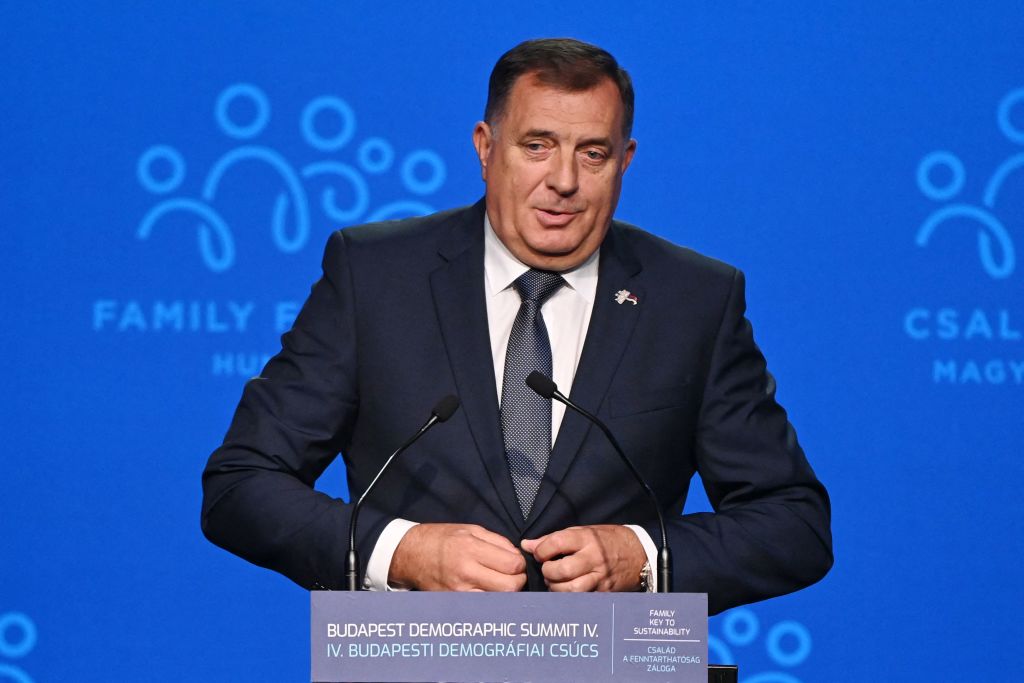U.S. slaps new sanctions on Bosnian Serb leader, calling him a threat to Balkan 'territorial integrity'


A free daily email with the biggest news stories of the day – and the best features from TheWeek.com
You are now subscribed
Your newsletter sign-up was successful
The U.S. Department of the Treasury announced Wednesday that it was imposing additional sanctions against Bosnian Serb leader Milorad Dodik and a media company he allegedly controls, Reuters reports.
A Treasury Department statement accused Dodik of "corrupt activities and continued threats to the stability and territorial integrity" of Bosnia and Herzegovina.
Last month, the lower house of the Republika Srpska passed a non-binding resolution that would decouple the semi-autonomous republic from Bosnia and Herzegovina's tax system, military, and judicial system.
The Week
Escape your echo chamber. Get the facts behind the news, plus analysis from multiple perspectives.

Sign up for The Week's Free Newsletters
From our morning news briefing to a weekly Good News Newsletter, get the best of The Week delivered directly to your inbox.
From our morning news briefing to a weekly Good News Newsletter, get the best of The Week delivered directly to your inbox.
Dodik, the Serb member of Bosnia's three-person inter-ethnic presidency, supported the vote. He favors removing the framework established by the 1995 Dayton Agreement, which ended the war that devastated the country following the breakup of the former Yugoslavia. "Bosnia is an experiment ... I don't believe it can survive because it does not have an internal capacity to survive," Dodik said at the time.
Under the Dayton framework, Bosnia and Herzegovina remains one nation but is divided into two enclaves: the ethnically Serbian Republika Srpska and the ethnically Croat and Bosniak Federation of Bosnia and Herzegovina. Most governmental functions devolve to the semi-autonomous governments of these entities. The nation's presidency is constitutionally required to be made up of a Serbian, a Croat, and a Bosniak.
Even before the December vote, Dodik's rhetoric was causing concern among international observers.
"The [Bosnia and Herzegovina] population is truly afraid of a new war, noticing the same worrying signs as in the 1990s," a pair of left-leaning Dutch members of European Parliament wrote in a November op-ed.
A free daily email with the biggest news stories of the day – and the best features from TheWeek.com
The MEPs concluded that unless Dodik and his followers faced "the realistic threat of targeted sanctions or another form of serious international pushback, they will continue to escalate this crisis, which could eventually result in secession, thereby risking a violent conflict."
Samuel Ramani, an associate fellow with the Royal United Services Institute for Defence and Security Studies, wrote on Twitter that the new U.S. sanctions were a "sign of growing U.S. assertiveness in Bosnia and pushback against [Russia's] influence in the Balkans."
Ramani told The Week that Dodik and Russian President Vladimir Putin have "a cordial personal relationship" and that Russia "has expressed concern about discrimination against Serbs within Bosnia and Herzegovina."
Grayson Quay was the weekend editor at TheWeek.com. His writing has also been published in National Review, the Pittsburgh Post-Gazette, Modern Age, The American Conservative, The Spectator World, and other outlets. Grayson earned his M.A. from Georgetown University in 2019.
-
 ‘Restaurateurs have become millionaires’
‘Restaurateurs have become millionaires’Instant Opinion Opinion, comment and editorials of the day
-
 Earth is rapidly approaching a ‘hothouse’ trajectory of warming
Earth is rapidly approaching a ‘hothouse’ trajectory of warmingThe explainer It may become impossible to fix
-
 Health insurance: Premiums soar as ACA subsidies end
Health insurance: Premiums soar as ACA subsidies endFeature 1.4 million people have dropped coverage
-
 NIH director Bhattacharya tapped as acting CDC head
NIH director Bhattacharya tapped as acting CDC headSpeed Read Jay Bhattacharya, a critic of the CDC’s Covid-19 response, will now lead the Centers for Disease Control and Prevention
-
 Witkoff and Kushner tackle Ukraine, Iran in Geneva
Witkoff and Kushner tackle Ukraine, Iran in GenevaSpeed Read Steve Witkoff and Jared Kushner held negotiations aimed at securing a nuclear deal with Iran and an end to Russia’s war in Ukraine
-
 Pentagon spokesperson forced out as DHS’s resigns
Pentagon spokesperson forced out as DHS’s resignsSpeed Read Senior military adviser Col. David Butler was fired by Pete Hegseth and Homeland Security spokesperson Tricia McLaughlin is resigning
-
 Judge orders Washington slavery exhibit restored
Judge orders Washington slavery exhibit restoredSpeed Read The Trump administration took down displays about slavery at the President’s House Site in Philadelphia
-
 Hyatt chair joins growing list of Epstein files losers
Hyatt chair joins growing list of Epstein files losersSpeed Read Thomas Pritzker stepped down as executive chair of the Hyatt Hotels Corporation over his ties with Jeffrey Epstein and Ghislaine Maxwell
-
 Judge blocks Hegseth from punishing Kelly over video
Judge blocks Hegseth from punishing Kelly over videoSpeed Read Defense Secretary Pete Hegseth pushed for the senator to be demoted over a video in which he reminds military officials they should refuse illegal orders
-
 Trump’s EPA kills legal basis for federal climate policy
Trump’s EPA kills legal basis for federal climate policySpeed Read The government’s authority to regulate several planet-warming pollutants has been repealed
-
 House votes to end Trump’s Canada tariffs
House votes to end Trump’s Canada tariffsSpeed Read Six Republicans joined with Democrats to repeal the president’s tariffs
